By: debbie lynn elias
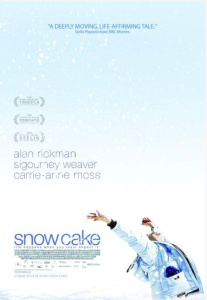
There’s something about a film described as beautifully heartfelt with a lacing of levity, insightful, moving, unique, touching, emotionally exhilarating and respectful, starring Alan Rickman and Sigourney Weaver that just compels one to watch for curiosity’s sake if nothing else. But, as the film starts to roll, it is apparent from the opening shot that SNOW CAKE is so much more than a curiosity; it is a beautiful example of storytelling and filmmaking. Alex Hughes is a complex man. An ex-con, having served time for killing a man, he is quiet and reserved but with a slightly sardonic streak and a pensive intensity that begs for scrutiny. A man clearly looking to resolve his inner demons and still possibly even serve emotional penance for his prior crime, Alex is travelling across country to visit and old-friend. As most do on a trip of this length, Alex stops at a local diner for a bit of respite and refreshment. But rest isn’t quite what he finds when he meets the alluring, albeit annoyingly talkative and a tad eccentric, Vivienne Freeman. Vivienne is looking for a ride (and maybe a bit more) and manages to coerce the tacit Alex into giving her a ride. Unfortunately, just as things start to pick up a little between the two, thanks to a wicked winter with icy roads, snow and bad drivers, they are involved in a horrific auto accident which leaves Vivienne dead. With a heavy heart and laden with guilt, Alex is compelled to speak with Vivienne’s mother. Alex is not prepared, however, for what he finds at the Freeman home.
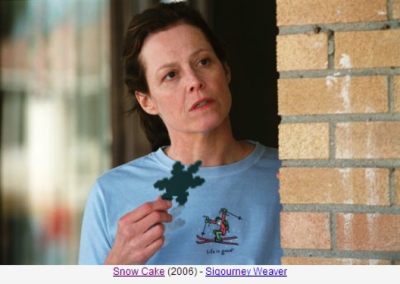
At first blush, Linda Freeman appears to be is an average, intelligent, middle-aged and good-looking woman. But that’s at first blush. As Alex starts to talk to Linda, he soon learns that first appearances are deceiving and Linda is, in fact, autistic. Although highly intelligent and capable, she is barely functional when it comes to the mundane tasks of everyday living, such as taking out the garbage, and has a childlike innocence about her. Amazed and confused at Linda’s life perspective (she is more affected by gifts from her daughter than her death), be it out of his own guilt or his own sense of loss or merely his intrigue with Linda’s outlook on life, Alex agrees to stay a few days, arrange Vivienne’s funeral – and take out the garbage. Helping his decision along is his meeting Maggie, Linda’s “high-spirited” next door neighbor who, according to Linda, is nothing more a hooker thanks to a rather open lascivious sexual appetite. As the days go by, through their differences, Linda and Alex find an unconventional commonality of strength and emotional development and growth, be it through games of Scrabble with Linda’s own made up words like “dezlious”, or obsessing with snow and just appreciating the joy of life by focusing on nothing. Both haunted by their past, frustrated by their present, but accepting of the cards life has dealt, their individual stories unfold like butterflies emerging from a cocoon seeing life in a new light.
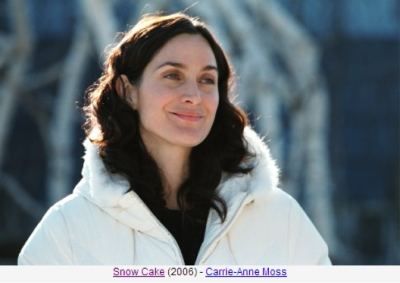
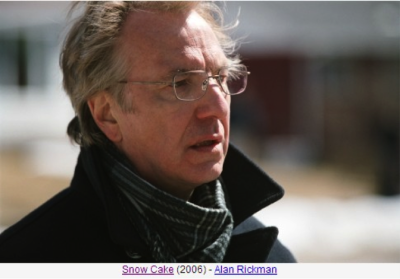 Best known as Professor Snape, Harry Potter’s potions professor or the nefarious Hans Gruber in “Die Hard”, Alan Rickman is not the first person I would have thought of to play Alex Hughes. Luckily for us, screenwriter Angela Pell did as it was Rickman whom she envisioned in the role the minute her pen hit the paper. Quite simply, Rickman is brilliant. He gives breadth and multi-dimensional texture to what could have been a linear character. Together with minimalistic crisp witted dialogue, much of his expressiveness is captured with his eyes, particularly when reacting to or interacting with Sigourney Weaver’s Linda. A perfect compliment to Rickman, Weaver brings a dazzling vulnerability and strength to Linda that belies any hindrance or limitation from her autism and in fact, celebrates Linda’s emotional insight and intuitiveness. Her performance is touching and respectful, incorporating many of the facets of autism into the character, bringing a gentle levity and sweetness to the work that allows for an honest interpretive reaction from Rickman. Having worked together before in “Galaxy Quest” to hilarious result, it was Rickman himself who on reading the script, called Weaver asking her to do the part of Linda.
Overcoming her fear of not being able to do justice to Linda and wanting to bring an honesty to the character, Weaver prepared for the part not only thanks to screenwriter Pell’s personal guidance, but also by spending time with Ros Blackburn, an autistic woman in England who although highly functioning, cannot read or write and cannot live alone. Incorporating many of Ms. Blackburn’s mannerisms and traits into Linda, the result is an award winning performance from Weaver.
Not to be overlooked is Carrie Ann Moss as Maggie. Already a Genie Award winner as Best Supporting Actress for her performance, she gives Maggie a sultry, earthy grit that blends well in the character mix. Providing needed sub-texture, her take on Maggie helps complete the picture of Alex giving him an emotional outlet of “normalcy” where Linda affords him intelligent rationality through analytical logic. Emily Hampshire is engaging as Vivienne, giving a nuanced performance that establishes a familial believability between Vivienne and Linda.
Best known as Professor Snape, Harry Potter’s potions professor or the nefarious Hans Gruber in “Die Hard”, Alan Rickman is not the first person I would have thought of to play Alex Hughes. Luckily for us, screenwriter Angela Pell did as it was Rickman whom she envisioned in the role the minute her pen hit the paper. Quite simply, Rickman is brilliant. He gives breadth and multi-dimensional texture to what could have been a linear character. Together with minimalistic crisp witted dialogue, much of his expressiveness is captured with his eyes, particularly when reacting to or interacting with Sigourney Weaver’s Linda. A perfect compliment to Rickman, Weaver brings a dazzling vulnerability and strength to Linda that belies any hindrance or limitation from her autism and in fact, celebrates Linda’s emotional insight and intuitiveness. Her performance is touching and respectful, incorporating many of the facets of autism into the character, bringing a gentle levity and sweetness to the work that allows for an honest interpretive reaction from Rickman. Having worked together before in “Galaxy Quest” to hilarious result, it was Rickman himself who on reading the script, called Weaver asking her to do the part of Linda.
Overcoming her fear of not being able to do justice to Linda and wanting to bring an honesty to the character, Weaver prepared for the part not only thanks to screenwriter Pell’s personal guidance, but also by spending time with Ros Blackburn, an autistic woman in England who although highly functioning, cannot read or write and cannot live alone. Incorporating many of Ms. Blackburn’s mannerisms and traits into Linda, the result is an award winning performance from Weaver.
Not to be overlooked is Carrie Ann Moss as Maggie. Already a Genie Award winner as Best Supporting Actress for her performance, she gives Maggie a sultry, earthy grit that blends well in the character mix. Providing needed sub-texture, her take on Maggie helps complete the picture of Alex giving him an emotional outlet of “normalcy” where Linda affords him intelligent rationality through analytical logic. Emily Hampshire is engaging as Vivienne, giving a nuanced performance that establishes a familial believability between Vivienne and Linda.
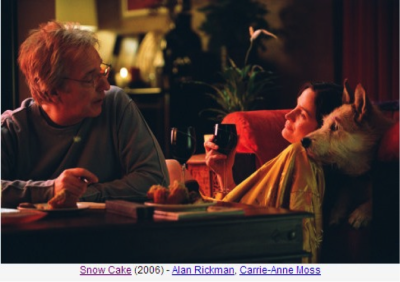
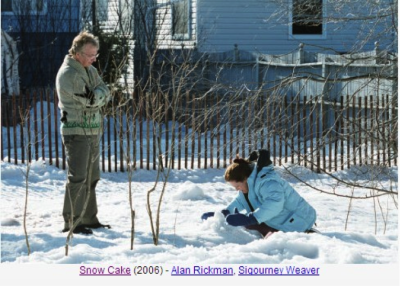 Walking a tightrope may be easier than developing and presenting a film like SNOW CAKE. There is a fine line in telling a heartfelt story involving an individual with an “unconventionality” such as autism without making it a mockery or an over-the-top maudlin melodrama. Director Marc Evans and writer Amanda Pell have walked that line with precision, arriving at a perfect balance. SNOW CAKE is based on Pell’s own experiences with her son who is autistic and draws much of the story and experiences from him. Likewise, she can and does first-hand address the reactions of others to an autistic person. Emotionally driven, Pell’s script is thoughtful and insightful, taking care to develop the characters and their relationships with an even hand.
Veteran British director Marc Evans handles the reins with a character driven sensitivity that showcases the complexities of each character. Known best for thrillers, this go round he has a soft touch that gives the film a well-crafted arthouse quality appeal. Impressive is the work of cinematographer Steven Cosens. Integral not only to Linda’s character, snow serves a metaphoric purpose as well as aiding in story evolution and growth. Shot on location in Canada, Cosens works wonders with the lens and Canada’s winter wonderland (even when they had to truck in snow) bringing sparkling revelation and life to the film.
SNOW CAKE is a bittersweet, intimate and eye-opening experience that celebrates life, acceptance and love. We should all be so lucky to know the joys of our own snow cake.
Linda: Sigourney Weaver
Alex: Alan Rickman
Maggie: Carrie Ann Moss
Directed by Marc Evans. Written by Amanda Pell. Rated R. (112 min)
For more information on autism, check out the Autism Society of America at www.autism-society.org or any other number of local organizations.
Walking a tightrope may be easier than developing and presenting a film like SNOW CAKE. There is a fine line in telling a heartfelt story involving an individual with an “unconventionality” such as autism without making it a mockery or an over-the-top maudlin melodrama. Director Marc Evans and writer Amanda Pell have walked that line with precision, arriving at a perfect balance. SNOW CAKE is based on Pell’s own experiences with her son who is autistic and draws much of the story and experiences from him. Likewise, she can and does first-hand address the reactions of others to an autistic person. Emotionally driven, Pell’s script is thoughtful and insightful, taking care to develop the characters and their relationships with an even hand.
Veteran British director Marc Evans handles the reins with a character driven sensitivity that showcases the complexities of each character. Known best for thrillers, this go round he has a soft touch that gives the film a well-crafted arthouse quality appeal. Impressive is the work of cinematographer Steven Cosens. Integral not only to Linda’s character, snow serves a metaphoric purpose as well as aiding in story evolution and growth. Shot on location in Canada, Cosens works wonders with the lens and Canada’s winter wonderland (even when they had to truck in snow) bringing sparkling revelation and life to the film.
SNOW CAKE is a bittersweet, intimate and eye-opening experience that celebrates life, acceptance and love. We should all be so lucky to know the joys of our own snow cake.
Linda: Sigourney Weaver
Alex: Alan Rickman
Maggie: Carrie Ann Moss
Directed by Marc Evans. Written by Amanda Pell. Rated R. (112 min)
For more information on autism, check out the Autism Society of America at www.autism-society.org or any other number of local organizations.












